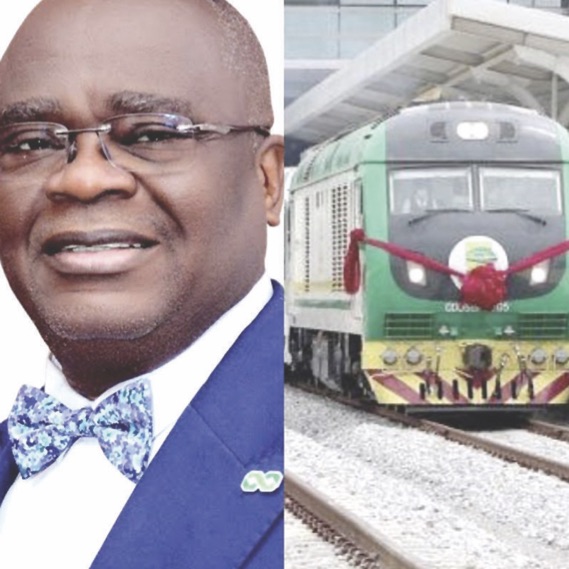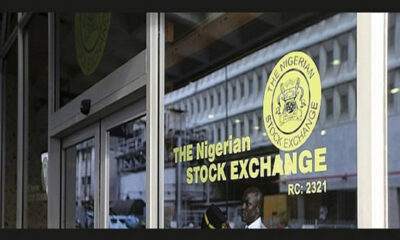Business
Naira hits new low at N820/$, as forex supply gap persists

Naira hits new low at N820/$, as forex supply gap persists
At the backdrop of sustained supply gap in Nigeria’s foreign exchange (forex) market, the local currency, Naira, has hit a new low at the weekend, trading N803.9 to a dollar in the Investors & Exporters (I&E) window which is the official forex market and N822/$ in the parallel market.
Financial Vanguard’s findings indicated a 6.6 per cent decline in volume of dollars traded in the I&E window as dealers said they were disappointed that the increase in supply they expected last week did not materialize.
A week-on-week trend in the parallel market shows a 5.5 percent depreciation to N822/$ as against N779/$ closing rate previous week.
In the I&E window, the local currency depreciated 3.9 percent W-o-W to N803.9/$ from N776.9/$ the previous Friday.
Financial Vanguard currency monitor shows that after the initial massive depreciation on June 14th, 2023 when the Central Bank of Nigeria, CBN, introduced reforms in the market, exchange rate had remained volatile with daily fluctuations until the record low was hit last weekend.
The reform majorly eliminated multiple exchange rates and reintroduced the ‘Willing Buyer Willing Seller’ market model in the I&E window.
Since the new measures were introduced, the Naira has depreciated cumulatively in the I&E window and parallel market by 70 per cent (N321.23) and 7.0 per cent (N58) respectively.
READ ALSO:
- Amusan sets new record, wins 100m hurdles at Silesia Diamond League
- Avoid ASSU strike during your tenure, MSSN tells Tinubu
- Abdullahi Adamu quits as APC national chairman
Meanwhile last week’s closing rate also indicated that the parallel market margin that narrowed to almost elimination following the new policy has started widening.
While the measures announced by CBN was aimed at increasing transparency and boosting confidence in order to attract increased forex supply, forex market operators who spoke to Financial Vanguard said the expected increase in supply is yet to materialize, adding that this, coupled with rising demand, and hoarding, are the factors driving the renewed depreciation of the naira in both segments of the forex market.
Speaking to Financial Vanguard, Mr. Ahmed Danjuma, a parallel market operator in Lagos Island, said: “I bought a dollar for N810 and sold for N819 and N820.
“People are demanding for the dollar. It is not easy to get dollars from the bank because it is very scarce.
“When you have access to dollars the way buyers demand for the currency is like when you take food to the prison.
“The supply is very low. Even Bureau De Changes have little access to the foreign currency.”
Similarly, Mr. Umoru Mohammed, a parallel market operator at Ikotun area of Lagos, said: “Dollar was very scarce today (last Friday) as we could hardly have access to it even from the banks.
“Every day the demand for dollars increases but the supply is very little. This is really hindering business especially for transactions requiring dollars.”
President, Association of Bureaux De Change Operators of Nigeria, ABCON, Aminu Gwadabe, in a chat with Financial Vanguard on the situation, stated: “The situation is tough, it even traded at N822 in some segments today (last Friday).
READ ALSO:
- Military alone can’t end North-East security crisis – Shettima
- Victory Gbakara wins N100m Nigerian Idol Season 8 prize
- Wimbledon 2023: Victory over Djokovic is dream come true, says Alcaraz
“You know now the restrictions have been removed, there is also competition and surge in demand. Most people are still holding assets in dollars, and we have not seen significant inflows even from the side of the investors.”
Turnover, external reserves fall
Reflecting the paucity of forex supply amidst rising demand, the volume of dollars traded (turnover) in the I&E window fell by 6.6 per cent or $57.06 million to $807.92 million in the first half of July, from $864.98 million in the corresponding period in June.
Following the same trend, the nation’s external reserves fell by $646 million or 1.9% in one month ending July 13th. Data from the CBN showed that the reserves fell to $34.047 billion on July 13th, from $34.693 billion on June 13th.
Analysts’ insight
To reverse this trend and achieve the expected increased forex inflow, analysts said the CBN must introduce further reforms including removing forex restriction on 43 items and incorporating BDCs into the I&E window as well as clearing the forex demand backlog.
In this regard, Managing Director/CEO Financial Derivatives Company, Mr. Bismarck Rewane, in his Monthly Economic News and Views, said: “In the short term the CBN must tighten monetary conditions, eliminate forex restrictions (Ban on 43 items on the I & E window) and move effective interest rates towards the rate of inflation.”
The above, he added,
”must be complemented in the long term with export-oriented policies, elimination of structural bottlenecks that constrain production and export activities”
In the same vein, analysts at Lagos based CardinalStone Research, in their outlook for H2’23, said: “While the current policy reforms bode well for foreign providers of capital, additional investments into the country will also be partly dependent on the following: 1) the willingness of the CBN to clear existing backlogs, which is estimated at $2.5 – $3.0 billion; 2) the FX market reflects a genuine “willing buyers and willing sellers” structure and supply begins to improve notably. If the 2 highlighted points are achieved, we see legroom for a surge in foreign inflows from the multi-year lows of $5.3 billion in 2022 to about $12 billion over the next one year.”
READ ALSO:
- BREAKING : Maguire confirms losing Man United captaincy
- Police arrest woman who flogged her aged mother in Anambra
- APC women leaders pass vote of no confidence in Beta Edu
On this Gwadabe averred that the CBN must increase participation in the official market to include BDC who can play the moderating role needed to stabilise the market.
“The trend will continue except if there is a turnaround, and there are changes in the I&E to bring in more players like BDCs to enhance competition. Once you have competition there will be stability, there will be availability
“They need to wear their thinking cap, because it is like the CBN is not in control of the market, it is the FMDQ. “We are still appealing to the CBN to include BDCs in order to increase liquidity, transparency, and ensure we stop the volatility in the market competition.”
Corroborating this position, a former top management staff of the CBN, who spoke on condition of anonymity said: “We must find a way out to stabilise the exchange rate and still keep the third leg (BDC) as part of the moderator of the market.
“We must eliminate abuses, corrupt practices and police the market for sustainability. We also need to restructure the BDC to trade in the market and not by allocation to moderate the rates.”
According to analysts at Cowry Assets Management Limited, “The Naira hit a new low in 2023 in the face of pressure demand for the dollar across various forex segments as forex demand and supply mismatch continue to play as an underlying driver with more backlog of unmet forex demand.”
Naira hits new low at N820/$, as forex supply gap persists
Business
CBN Policies, Foreign Inflows Drive Naira to Two-Year Peak

CBN Policies, Foreign Inflows Drive Naira to Two-Year Peak
Nigeria’s naira has extended its recent rally, trading at one of its strongest levels against the U.S. dollar in nearly two years, supported by sustained foreign portfolio inflows, tighter liquidity management, and targeted policy interventions by the monetary authorities.
A macroeconomic update by CardinalStone shows that the local currency has appreciated 6.9 per cent year-to-date at the official foreign exchange market, closing at ₦1,347.78/$—its strongest performance since early 2024. The appreciation reflects improved FX liquidity and growing confidence in the official trading window.
Despite the gains, a gap persists between the official and parallel markets. However, the premium narrowed from about 5.7 per cent to roughly 3.2 per cent following renewed foreign exchange interventions by the Central Bank of Nigeria. According to CardinalStone, the compression of the spread indicates stronger liquidity conditions in the official market, reducing incentives for speculative trading and arbitrage.
As part of efforts to further stabilise the FX market, the CBN recently authorised licensed Bureau de Change (BDC) operators to access foreign exchange from approved dealers at prevailing market rates, subject to a weekly cap of $150,000 per BDC and strict Know-Your-Customer (KYC) requirements. Under the framework, operators must sell unused FX balances within 24 hours, limit cash transactions to 25 per cent of total trades, and settle transactions through licensed financial institutions.
READ ALSO:
- Edo Governor Okpebholo Names Mercy Johnson-Okojie Special Adviser
- Many Feared Dead as Suspected Lakurawa Militants Attack Kebbi Communities
- AMAC Polls Shock: Another PDP Candidate Withdraws from FCT Race, Backs APC
With 82 licensed BDCs currently operating, CardinalStone estimates that potential FX supply to the segment could rise to about $50 million monthly. Although this remains significantly below pre-pandemic levels, the renewed supply has helped ease retail FX demand pressures and compress the premium in the parallel market.
While foreign inflows have strengthened the naira, analysts caution that continued appreciation could prompt profit-taking by offshore investors. CardinalStone estimates outstanding foreign portfolio investment (FPI) exposure at between $12 billion and $14 billion, noting that Nigeria’s carry trade remains one of the most attractive across emerging and frontier markets.
The firm added that assuming many investors entered the market at around ₦1,500/$, a move toward ₦1,200–₦1,250/$ could deliver over 22 per cent FX gains on currency alone. Such gains could heighten the risk of portfolio rebalancing or exits, particularly as political and election-related uncertainties begin to build.
Ahead of the latest meeting of the Monetary Policy Committee, analysts describe the macroeconomic signals facing policymakers as mixed. Inflation has started to moderate, while short-term interest rates have converged near 22 per cent, about 500 basis points below the 27 per cent Monetary Policy Rate (MPR).
However, the CBN has signalled low tolerance for excess liquidity, intensifying Open Market Operations (OMO) issuances and keeping the Standing Deposit Facility (SDF) attractive to absorb surplus funds and prevent renewed inflationary pressure. Analysts also point to concerns around election-related liquidity, which is expected to intensify in the second half of the year, with over 75 per cent of projected 2026 liquidity expected in the first half.
Looking ahead, CardinalStone expects the CBN to hold the policy rate while adjusting the asymmetric corridor to align SDF rates with OMO yields and preserve the attractiveness of naira assets for foreign investors. Forward market indicators suggest a softer currency path later in the year, with the naira projected to trade within a ₦1,350–₦1,450/$ range in 2026, despite the recent rally.
CBN Policies, Foreign Inflows Drive Naira to Two-Year Peak
Railway
Railway track vandalism: Urgent need for laws prohibiting scrap/metal picking to protect critical assets

Railway track vandalism: Urgent need for laws prohibiting scrap/metal picking to protect critical assets
By Onyedikachi Stanley Onovo
The wanton destruction and theft of Nigeria’s railway infrastructure and other critical public assets represent one of the gravest threats to national development and security.
Across the nation—from the Warri-Itakpe line to Abuja-Kaduna, the Eastern and Western Districts, Lagos-Ibadan, and throughout the Northern network—vandals systematically dismantle tracks, steal armoured cables, and pillage essential equipment. This crisis demands an immediate and robust legislative response.
The unending menace
The vandalism is perpetrated by a network of individuals, from local miscreants (“iron condemn”) to organised merchants who purchase and export stolen materials. Security reports and countless arrests underscore the scale of the problem:
In December 2023, a private security firm arrested 13 suspects for vandalising Abuja Mass Transit Rail assets. The suspects were said to be casual workers engaged by a Chinese company working on the railways, but said to have used the opportunity to steal the materials.
On June 2024, The Cable reported that the Nigerian Army arrested 47 suspected rail track vandals in Kaduna State.
In October 2025, police arrested a suspect vandalising railway electrical installations also in Kaduna State.
Radio Nigeria in December 2025 announced the arrest of three persons in Kwara State for vandalizing and stealing Railway clips and nuts in Offa.
In May 2021, TVC reported some individuals, including one Ejike Okeke were apprehended in Enugu with stolen sleepers and tracks.
On the 30th of January 2026 the Nigerian Television Authority reported that the NSCDC, Bauchi State Command arrested five suspects and intercepted a truck carrying vandalized railway tracks.
This relentless assault has plagued successive management of the Nigerian Railway Corporation (NRC), defying conventional counter-strategies.
A transformative leadership initiative
A pivotal shift began under the administration of President Bola Ahmed Tinubu with the appointment of Dr. Kayode Opeifa as Managing Director/CEO of the NRC.
Dr. Opeifa introduced a fundamental paradigm shift by redesignating what was carelessly termed “scrap” as “unserviceable critical national assets.”
This reframing has driven a transformative partnership with experts to manage these assets responsibly. The era of controversial public auctions—which often saw valuable national iron assets disappear, depriving Nigeria of materials for repurposing and industrialisation—is now over.
Today, a systematic process ensures these materials are reused or responsibly processed, with revenue reinvested into the Corporation. This home-grown solution is a commendable breakthrough that proves Nigerians can effectively solve national challenges.
The critical legislative gap: Targeting the market
While the NRC’s internal reforms are laudable, they alone cannot stem the tide. The root enabler of this vandalism is the thriving, unregulated market for stolen metal. To kill the vandal’s incentive, we must eradicate the demand.
Therefore, there is an urgent need for the National Assembly to enact legislation that:
1. Prohibits the buying and selling of any railway materials (serviceable or unserviceable) on the open market.
2. Imposes severe penalties on buyers and merchants of vandalised public assets, effectively targeting the economic drivers of this crime.
3. Mandates stringent federal regulation of all scrap metal dealers nationwide.
THE SCRAP DEALER NEXUS
The opaque operations of scrap dealers are a major concern. Their compounds are often shrouded, hiding the provenance of their materials. This unregulated space fuels not only railway vandalism but also community theft—from iron crossing bars in homes to street lamp holders.
Trailers loaded with questionable materials move freely from cities and expressways to unknown destinations. Without regulating this sector, our fight against vandalism remains superficial.
CONCLUSION
The partnership and innovation under Dr. Opeifa’s leadership at the NRC demonstrate what is possible with commitment and vision.
However, to secure our railways, power installations, and other critical assets, we must complement this institutional resolve with strong, deterrence-based law. Legislation that dismantles the market for stolen public property is not an option; it is a national imperative for Nigeria’s security and industrial future.
*Onyedikachi Stanley Onovo, Ph.D
FCAI, ANIPR
onyedikachionovo1@gmail.com excellentdikachi@yahoo.com
Auto
MOMAN, ALCMAN Partner BKG to Drive Nigeria’s Shift from Auto Imports to Industrial Production

MOMAN, ALCMAN Partner BKG to Drive Nigeria’s Shift from Auto Imports to Industrial Production
In what industry stakeholders view as a decisive move toward industrial rebirth, BKG Exhibitions Limited has entered into a strategic partnership with the Motorcycle Manufacturers Association of Nigeria (MOMAN) and the Automotive Local Content Manufacturers Association of Nigeria (ALCMAN) to accelerate local automotive manufacturing and reduce the country’s heavy reliance on imports.
The alliance, formalised in Lagos, signals a coordinated private-sector effort to reposition Nigeria’s automotive ecosystem from an import-dependent market to a production-driven industrial base capable of delivering value addition, technology transfer, and large-scale employment.
For decades, Nigeria’s automotive sector has been dominated by the importation of fully built vehicles and, more recently, the assembly of semi-knocked-down (SKD) and completely knocked-down (CKD) kits.
While these models generated commercial activity, stakeholders argue they failed to build deep industrial capacity or strengthen indigenous engineering expertise.
The new partnership seeks to change that narrative by transforming trade exhibitions into structured industrial platforms that connect manufacturers with policymakers, institutional buyers, investors, and international technical partners.
A senior executive at BKG Exhibitions said the collaboration represents a deliberate shift in strategy.
“Exhibitions must go beyond passive marketplaces. They must become engines of economic transformation where Nigerian manufacturers secure contracts, attract capital, and demonstrate production competence,” he said, noting that Nigeria already possesses strong demand but lacks a coordinated ecosystem to convert that demand into domestic output.
“Nigeria remains one of Africa’s largest mobility markets, driven by rapid urbanisation, a growing youth population, and expanding last-mile logistics services.
“Motorcycles and tricycles play a critical role in urban transport, agriculture distribution, and the fast-growing delivery economy.
“However, a substantial portion of these vehicles and their components are imported, placing pressure on foreign exchange and limiting domestic industrial growth.”
MOMAN President Rev. Lambert Ekewuba emphasized that strengthening local production would go beyond import substitution.
“When we manufacture locally, we create jobs, retain capital, and build the technical foundation for advanced automotive engineering,” he said.
ALCMAN Chairman, Chief Anselm Ilekuba, stressed the importance of developing a resilient components ecosystem, describing it as the backbone of any successful automotive industry.
“No country becomes an automotive powerhouse without first nurturing strong supplier networks. Nigeria must empower small and medium-scale enterprises producing metal parts, plastics, electrical systems, and other inputs,” he said.
Under the alliance, future exhibitions will feature dedicated pavilions showcasing Nigerian-made components and vehicles, offering manufacturers direct access to government agencies, transport operators, and regional distributors.
Analysts believe such curated exposure could gradually shift procurement patterns toward locally produced alternatives.
Beyond the domestic market, the partnership aims to position Nigeria as a manufacturing hub serving West and Central Africa, leveraging opportunities under the African Continental Free Trade Area (AfCFTA).
Industry leaders say expanding export capacity will depend on strengthening standards, financing mechanisms, and technical capability.
The alliance also plans coordinated advocacy for policies that support localisation, including improved access to financing, reduced duties on industrial machinery, technical training aligned with modern production systems, and procurement frameworks favouring locally manufactured goods.
Economists argue that a revitalised automotive manufacturing base could stimulate growth across steel, petrochemicals, logistics, warehousing, and tooling industries, reinforcing the sector’s role as a catalyst for broader industrialisation.
Coming at a time when Nigeria is intensifying efforts to diversify its economy away from oil dependence, stakeholders say the success of this alliance could mark a turning point — shifting the country from being one of Africa’s largest automotive consumption markets to an emerging centre of production, innovation, and regional trade.
-

 Politics2 days ago
Politics2 days agoPeter Obi Launches ‘Village Boys Movement’ to Rival Tinubu’s City Boys Ahead of 2027
-

 International3 days ago
International3 days agoCanada Opens New Express Entry Draw for Nigerian Workers, Others
-

 News2 days ago
News2 days agoPolice to Arrest TikToker Mirabel After She Recants False Rape Claim
-

 International2 days ago
International2 days agoEpstein, Ex-Israeli PM Named in Alleged Profiteering From Boko Haram Crisis
-

 metro3 days ago
metro3 days agoOsun Awards 55.6km Iwo–Osogbo–Ibadan Road Project to Three Contractors
-

 Education9 hours ago
Education9 hours agoUTME: JAMB Clarifies Position on Hijab During Biometric Capture
-

 Politics3 days ago
Politics3 days agoUpdated: Rivers Senator Mpigi Barinada dies at 64
-

 metro3 days ago
metro3 days agoOndo Monarch Killed as Bandits Strike Akure North











